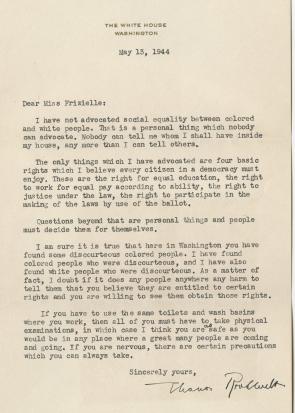Eleanor Roosevelt’s four basic rights, 1944
A Spotlight on a Primary Source by Eleanor Roosevelt
 First Lady Eleanor Roosevelt, a lifelong advocate of equal rights, used her position as First Lady to advocate against discrimination in the United States. However, Mrs. Roosevelt’s ideas were not embraced by everyone in the pre-civil rights era when segregation and racism were institutionalized in American economics, politics, and society. In this letter from 1944 Mrs. Roosevelt responded to one of her critics, Addie Frizielle, who worried about the desegregation of restrooms and forced social interaction between the races in the government’s movement toward racial equality in some spheres.
First Lady Eleanor Roosevelt, a lifelong advocate of equal rights, used her position as First Lady to advocate against discrimination in the United States. However, Mrs. Roosevelt’s ideas were not embraced by everyone in the pre-civil rights era when segregation and racism were institutionalized in American economics, politics, and society. In this letter from 1944 Mrs. Roosevelt responded to one of her critics, Addie Frizielle, who worried about the desegregation of restrooms and forced social interaction between the races in the government’s movement toward racial equality in some spheres.
The First Lady deftly responded to the woman, dismissing her concerns about socialization and desegregation, while enumerating the "four basic rights which I believe every citizen in a democracy must enjoy. These are the right for equal education, the right to work for equal pay according to ability, the right to justice under the law, the right to participate in the making of the laws by use of the ballot."
Transcript
Eleanor Roosevelt to Addie Frizielle, May 13, 1944.
May 13, 1944
Dear Miss Frizielle:
I have not advocated social equality between colored and white people. That is a personal thing which nobody can advocate. Nobody can tell me whom I shall have inside my house, any more than I can tell others.
The only things which I have advocated are four basic rights which I believe every citizen in a democracy must enjoy. These are the right for equal education, the right to work for equal pay according to ability, the right to justice under the law, the right to participate in the making of the laws by use of the ballot.
Questions beyond that are personal things and people must decide them for themselves.
I am sure it is true that here in Washington you have found some discourteous colored people. I have found colored people who were discourteous, and I have also found white people who were discourteous. As a matter of fact, I doubt if it does any people anywhere any harm to tell them that you believe they are entitled to certain rights and you are willing to see them obtain those rights.
If you have to use the same toilets and wash basins where you work, then all of you must have to take physical examinations, in which case I think you are as safe as you would be in any place where a great many people are coming and going. If you are nervous, there are certain precautions which you can always take.
Sincerely yours,
Eleanor Roosevelt
